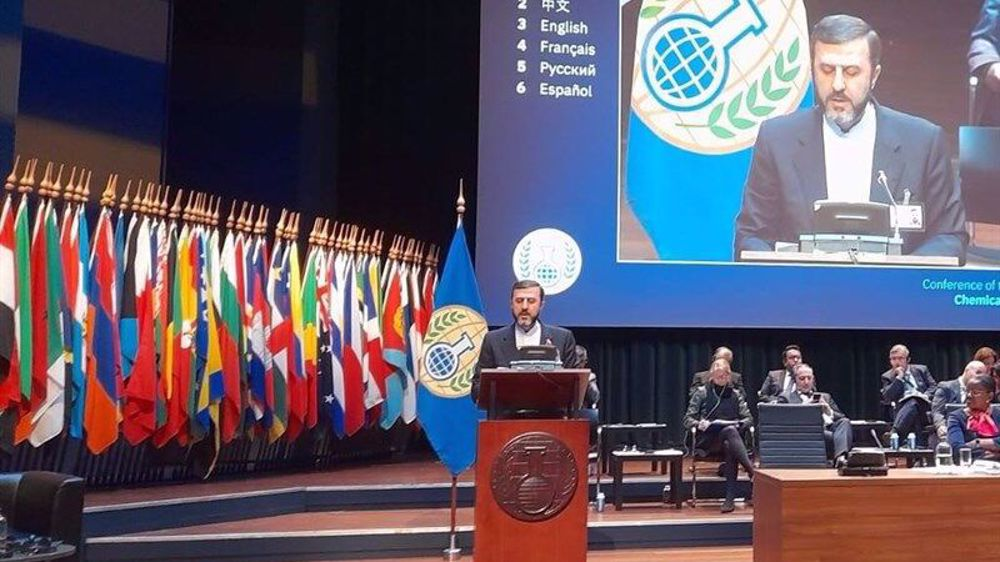
Kazem Gharibabadi, head of the Iranian Judiciary’s High Council for Human Rights, delivers a speech at the 29th Session of the Conference of the States Parties to the Chemical Weapons Convention (CSP-29) held in The Hague on November 27, 2024.
The Hague, November 30 (RHC)-- Iran says the United Nations Security Council must impose sanctions on Israel over its use of banned chemical weapons against “defenseless people” in Palestine and Lebanon.
Kazem Gharibabadi, who serves as head of the Iranian Judiciary’s High Council for Human Rights, made the request during his speech at the 29th Session of the Conference of the States Parties to the Chemical Weapons Convention (CSP-29) held in The Hague earlier this week.
“The Zionist regime, with unconditional support from certain Western countries, particularly the United States, continues its crimes in Palestine and Lebanon while unfortunately enjoying impunity.
“The United Nations Security Council must take action under Chapter VII of the UN Charter to impose effective sanctions against the Zionist regime, and all countries should refrain from any economic, military, or arms cooperation with this regime.”
“We condemn the Zionist regime's use of chemical weapons and other hazardous materials, including white phosphorus and depleted uranium, against the defenseless people of Palestine and Lebanon.
“We call on the director-general of the Organization for the Prohibition of Chemical Weapons (OPCW) to conduct a comprehensive investigation into this matter and take necessary measures to protect the victims,” Gharibabadi stated.
The occupying regime has in numerous occasions used banned white phosphorus as well as prohibited bombs containing depleted uranium against the people in Lebanon and the besieged Gaza Strip.
Last month, Lebanon’s state news agency reported Israeli artillery shelling using phosphorus shells on the outskirts of Kfar Shuba.
On September 27, Israeli occupation forces dropped over 80 tons of explosives on the southern suburb of Beirut using bunker-buster bombs, which contained depleted uranium (DU).
Back in March, Human Rights Watch (HRW) reported that Israel had used white phosphorus bombs in south Lebanon once again, warning that the regime’s “use of airburst white phosphorus munitions in populated areas indiscriminately harms.”
In its investigation, HRW also verified the use of white phosphorus munitions by the Israeli military in at least 17 municipalities across south Lebanon since October 2023.
Israel launched its genocidal campaign in the Gaza Strip in October 2023. The regime has used banned white phosphorus munitions in many occasions since the onset of the campaign.
“The arsenal of weapons of mass destruction held by the Israeli regime, including chemical weapons, poses a serious threat to regional and international peace and security.
“Therefore, ensuring the global implementation of the convention and exerting international pressure on the Zionist regime to join the convention and place all its chemical facilities under the supervision of the OPCW is essential,” Iran’s rights chief stated.
Elsewhere in his remarks, Gharibabadi, who also serves as the Deputy Foreign Minister for Legal and International Affairs, said the victims of chemical weapons in Iran are still suffering from the illegal Western sanctions in the area of medical supplies and equipment.
“The OPCW must make serious and effective efforts to support these victims.”
[ SOURCE: PRESS TV ]

